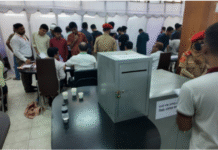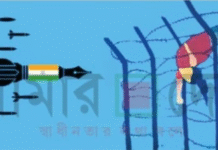Farhana Syead
Human Rights Watch says some Israeli airstrikes have no lawful military objective
It is interesting to note that Israel’s brutality against the civilians in Gaza has made more than 50 former Israeli soldiers refuse to serve in the nation’s reserve force, citing regret over their central role played in oppressing Palestinians. Their statements reflect that the entire military helps implement the oppression of the Palestinians.
This is not the first time that Israeli soldiers have shown regret. In 2009, the Israeli Military College published very damaging statements and accounts by its own soldiers, describing their killing of innocent and mostly unarmed civilians, and their wanton vandalism during Israel’s 22-day assault on the Gaza Strip.
Among the accounts by graduates of the Yitzhak Rabin Pre-military Academy at Oranim Academic College, and published in the academy’s newsletter, one that was particularly horrifying described an IDF sniper killing a mother and her small children at close range after Israeli soldiers had suddenly ordered them to leave their home.
Thus, along with the worldwide outrage on Israel’s war crimes against Palestinians, guilt among Israeli soldiers and also its supporters can be noticed. There are several arguments outlining a framework for a future legal procedure to hold Israel legally accountable for human rights violations against the people of Gaza. In this scenario, let us scrutinise the matter a bit further in understanding the reasons for which we can identify the ongoing brutality perpetrated by Israel against Palestinian civilians as war crimes.
War crimes are defined in the Charter of the International Military Tribunal, Nuremberg, of August 8, 1945 and confirmed by the General Assembly of the UN, particularly the “grave breaches” enumerated in the Geneva Conventions of August 12, 1949 for the protection of war victims.
A war crime is a serious violation of the laws and customs of war (also known as the international humanitarian law) giving rise to individual criminal responsibility. It denotes murdering, mistreating, or deporting civilian residents of an occupied territory.
War crimes include violations of the recognised rules of warfare by members of the armed forces, illegitimate hostilities in arms committed by individuals who are not members of armed forces, espionage and war treason, and marauding.
According to Principle IV of the Report of the International Law Commission, war crimes are the violations of the laws and customs of war which include, but are not limited to, murder, ill-treatment or depredation to forced labor, or for any other purpose of civilian population. This time, Israel’s war crimes can be mounted from the massacre of more than 800 civilians in Gaza. Again, a war is declared against civilians, most of them are children and the youth. 43% of Gaza’s population is aged 0-14 and just under 21% are 15-24. Thus 64% is aged 0-24.
Aid agencies said a child had been killed every hour on average (over two days), and there had been a sharp spike in premature births. In addition, more than 3,000 homes had been destroyed or damaged, and that 46 schools, 56 mosques, and seven hospitals had been hit.
Among a number of incidences that clearly show Israel’s war crimes, take the example of the attack on the UN-run school in Gaza. An elementary school packed with hundreds of Palestinian evacuees seeking shelter under UN protection came under heavy fire, leaving 16 people dead and more than 100 wounded, including women, children, and infants.
Human Rights Watch says some Israeli airstrikes have no lawful military objective. One crucial element in any lawful attack is that it is directed at a reasonably certain military target. But in a number of airstrikes before the ground invasion that Human Rights Watch investigated, no evidence of a lawful military objective has been found. There were none evident at the Fun Time Beach café, where an Israeli attack on July 11 killed nine civilians, including two boys, who had gathered to watch the World Cup.
It is pertinent to say that the world has watched a military superpower shelling, bombing, and attacking a relatively defenseless and captive population of 1.8 million people in the Gaza Strip, a piece of land which qualifies as the world’s largest open prison — a ghetto by any other name. The scale of death and destruction appears to be aimed not just at lessening the actual threat from Hamas, but also at punishing Gazans for elevating Hamas to power in the first place. Netanyahu seems determined to teach them a lesson.
Despite the fact, only 29 of the UN Human Rights Council’s 47 members voted in favour of creating a commission of inquiry to look at possible war crimes committed by Israel. Only the United States voted against the resolution, while 17 states abstained, 10 of them European. Regardless of the role of Western leaders, and their willingness in giving succour to Israel’s war crimes, people have not been silent.
All over the world, there have been massive demonstrations of solidarity with the Palestinians in Gaza, and with every man, woman, and child slaughtered or maimed, more and more are raising their voices, calling for boycotting Israel, just as they did against apartheid in South Africa.
The cause of the Palestinian people is the cause of humanity of our time. It will push governments and the United Nations to support the Palestinian call for pressure on Israel. Thus, the UN is responsible for fulfilling its charter duties, and it must use the leverage and stand against Israel’s war crimes.
Source: Dhaka Tribune









